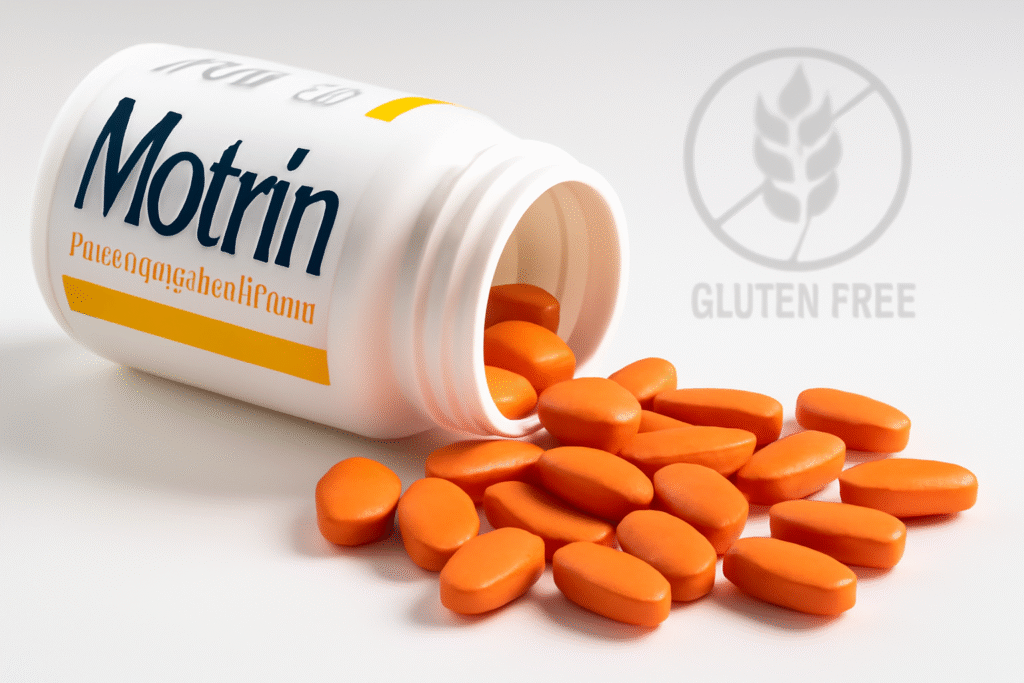When people living with celiac disease, gluten intolerance, or non-celiac gluten sensitivity reach for over-the-counter pain relief, one question often comes to mind—is Motrin gluten free? Motrin, a well-known brand of ibuprofen, is widely used for headaches, muscle pain, arthritis, fever, and inflammation. However, not everyone can safely take it without checking the ingredients, especially those who must avoid gluten at all costs.
The good news is that most Motrin products available today are considered gluten free, but there are some important details, disclaimers, and safety notes you need to know before taking them. This guide explores the gluten status of Motrin, how to read labels properly, safe alternatives, and what experts and the manufacturer have said.
Understanding Motrin and Its Uses
Motrin is a nonsteroidal anti-inflammatory drug (NSAID) with the active ingredient ibuprofen. It works by reducing hormones in the body that cause pain and inflammation. Doctors and pharmacists commonly recommend it for:
-
Headaches and migraines
-
Menstrual cramps
-
Toothaches
-
Muscle aches and back pain
-
Fever reduction
-
Minor arthritis pain
For most people, Motrin is a safe and effective medication when taken as directed. But for those with gluten sensitivity or celiac disease, the concern is not about the ibuprofen itself, but about possible gluten-containing inactive ingredients or cross-contamination during manufacturing.
Why Gluten in Medicine Matters
Gluten is a protein found in wheat, barley, and rye. Even tiny amounts can trigger harmful reactions in people with celiac disease, leading to digestive issues, nutrient deficiencies, and long-term intestinal damage. For gluten-sensitive individuals, gluten can still cause symptoms like bloating, fatigue, and brain fog.
Since medicine is not always regulated with the same labeling requirements as food, it becomes challenging for patients to know if a pill, capsule, or liquid formulation is gluten free. Even small traces of gluten from binders, fillers, or coatings could be enough to trigger a reaction.
That is why asking “is Motrin gluten free?” is not just a casual question—it’s an important health concern.
Ingredients in Motrin That May Contain Gluten
Motrin products contain ibuprofen as the active ingredient. The concern lies in the inactive ingredients, which can include:
-
Corn starch
-
Microcrystalline cellulose
-
Magnesium stearate
-
Croscarmellose sodium
-
Titanium dioxide (in coatings)
None of these ingredients are typically sourced from wheat, barley, or rye. However, inactive ingredients can vary between product types (liquid gels, chewables, suspensions) and manufacturers may change formulas over time.
Some fillers like starch can be derived from wheat, though in the U.S., pharmaceutical-grade starch is usually corn-based. Still, without manufacturer confirmation, patients cannot assume safety.
Manufacturer’s Statement on Gluten in Motrin
Johnson & Johnson, the parent company of Motrin, has stated that Motrin products do not contain gluten as an intentional ingredient. However, they also acknowledge that they cannot guarantee absolute absence of gluten due to potential cross-contamination during manufacturing.
This means most people with gluten intolerance may safely take Motrin, but those with severe celiac disease should still consult their doctor before use.
Which Motrin Products Are Gluten Free?
While the manufacturer does not label Motrin as “certified gluten free,” most of the following products are considered safe based on ingredient lists:
-
Motrin IB tablets
-
Motrin IB liquid gels
-
Children’s Motrin suspension
-
Infant’s Motrin drops
Chewable tablets should be reviewed more carefully, since flavored medications sometimes include additives that could contain gluten.
How to Verify if Medicine Is Gluten Free
For those living a strict gluten-free lifestyle, here are steps to confirm the safety of medicines like Motrin:
-
Read the ingredient label carefully. Look for words like “starch,” “maltodextrin,” or “modified food starch.”
-
Check the manufacturer’s website. Most pharmaceutical companies list allergen information.
-
Call the manufacturer directly. Customer service can confirm gluten status of specific products and lots.
-
Ask your pharmacist. They have access to professional resources that list inactive ingredients.
-
Look for gluten-free certification. Although rare in medications, some supplements and over-the-counter drugs carry this label.
Motrin Alternatives That Are Gluten Free
If you are uncertain about Motrin, there are other pain relief options:
-
Tylenol (acetaminophen): Generally considered gluten free and a safe alternative for pain and fever relief.
-
Advil (ibuprofen): Similar to Motrin, but confirm each formulation’s gluten status.
-
Aleve (naproxen): Another NSAID option, though gluten safety varies by brand.
-
Generic ibuprofen: Some store brands provide clearer gluten-free labeling.
Always check inactive ingredients and consult with a healthcare professional before switching medications.
Motrin and Celiac Disease
For those with celiac disease, gluten avoidance is not optional. Even small amounts can cause intestinal damage and long-term health risks. While Motrin is unlikely to contain gluten, the lack of certified labeling means individuals with celiac disease should approach cautiously.
Some patients report successfully taking Motrin without issues, while others prefer to stick to medications that carry gluten-free certifications. Ultimately, the best approach is to consult your physician and pharmacist before use.
Risks of Taking Motrin Beyond Gluten Concerns
Even if Motrin is gluten free, it still carries potential risks:
-
Stomach irritation and ulcers (especially with long-term use)
-
Increased risk of bleeding
-
Kidney issues in some individuals
-
Possible allergic reactions
Those with existing stomach conditions or on blood-thinning medication should use Motrin carefully and only as directed.
Motrin Gluten Free – Final Thoughts
So, is Motrin gluten free? The short answer is yes—Motrin products generally do not contain gluten. However, because manufacturers cannot guarantee zero contamination, individuals with celiac disease should proceed carefully.
Checking the label, contacting the manufacturer, and consulting healthcare professionals are the best ways to ensure safe pain relief. For those with severe gluten sensitivity, considering alternatives like Tylenol may provide extra peace of mind.
Also read : Mississippi Mud Cheesecake: A Decadent Dessert You Must Try
FAQs
Does Motrin contain wheat or barley?
No, Motrin does not list wheat, barley, or rye as ingredients. However, cross-contamination during manufacturing cannot be completely ruled out.
Is Children’s Motrin gluten free?
Yes, Children’s Motrin liquid suspensions are generally considered gluten free, but always double-check the label before use.
Is Motrin certified gluten free?
No, Motrin does not carry official gluten-free certification. It is considered gluten free based on ingredients but not officially labeled.
What pain reliever is safest for celiac disease?
Tylenol (acetaminophen) is widely considered the safest option, as most versions are labeled gluten free.
Can Motrin cause stomach issues unrelated to gluten?
Yes, Motrin is an NSAID and may cause stomach irritation, ulcers, or digestive discomfort even in people without gluten sensitivity.
How can I confirm if my Motrin bottle is gluten free?
You can call Johnson & Johnson, check their official website, or consult your pharmacist for the most up-to-date product information.
Conclusion
Motrin remains a trusted choice for millions of people seeking relief from pain, fever, and inflammation. For most, it is safe and effective. For those with gluten intolerance or celiac disease, the answer to “is Motrin gluten free?” is generally yes—but with an important caveat. Because there is no official gluten-free certification, patients should remain cautious, verify each product, and consult medical professionals before use.
With the right precautions, you can make an informed decision and find safe relief—whether with Motrin or an alternative pain reliever.



